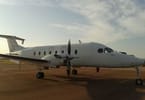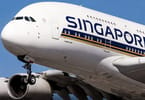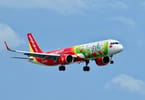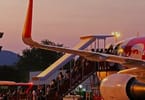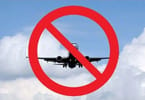London could lose its place as a main gateway to Europe if the UK government goes ahead with plans to increase Air Passenger Duty (APD) next November. The warning comes from ETOA, which represents inbound European tour operators.
The Netherlands and Belgian governments have this month abolished departure taxes in an effort to give a stimulus to tourism through their international airports, raising concerns amongst European tour operators that Amsterdam and Brussels may be more attractive and economically efficient start and end ports for inbound tour groups from overseas.
The cost of ADP, when added to other government charges such as visa fees, is making the UK an expensive destination for the start and end of group tours to Europe, according to ETOA’s Executive Director, Tom Jenkins. With the UK standing outside the Schengen Agreement on a common visa for travel to Europe, the country is looking increasingly like an optional add-on than a key element of a visit to Europe for many in-bound long-haul travelers.
“What Dutch have done is sensible and this will boost inbound tourism. They have realized that inbound market has a choice and this move will attract inbound traffic,” said Jenkins.
“London is losing its gateway status. Scheduled tours used to start and finish in London now more and more start and finish on the continent. It used to be the automatic entry point and it is now becoming a bolt on extra. London is seen as optional rather than central.
“This has been exacerbated by the decision to stay outside Schengen, by very high visa fees and by the hike in APD. This blanket charge punishes people for choosing to come here. Whatever this does for the treasury; it is a stinging tax on exports.”
Under the proposals APD will be charged on international departures from the UK on a new four-level scale related to the distance from London to the capital city of the destination country. The increases are due to take effect from November 2009 with a further rise set for November 2010.
From 1 November the new APD starts at £11 on tickets to destinations within 2,000 miles of London, £45 on flights up to 4,000 miles, £50 on flights up to 6,000 miles and £55 on flights over 6,000 miles. From November 2010, the charges are £12, £60, £75 and £85. All these sums are doubled on premium class tickets, including premium economy where it is available.
This means that for visitors to the UK returning home to key long-haul market countries including Australia, New Zealand, Malaysia and travelers to the Caribbean, the departure tax will be more than double the £40 charged at present. Tourism ministers have protested to the UK government. A delegation of ministers and officials from several Caribbean countries was in London recently to lobby the Government and MPs for a change of heart and warned them that the APD rises could harm their economies which were more than ever reliant on tourism.
No other countries operate such a method of charging departure taxes in geographical tiers. Australia has just increased its departure tax from AU$9 to AU$47 across all departures and New Zealand has moved its single departure tax from a cash payment at Auckland airport onto airlines to charge through ticket prices. Hong Kong also operates a flat rate tax of HK$120 on all departing passengers over 12 years old.
UKinbound Chief Executive, Mary Rance, said the rises in APD would harm Britain’s appeal to visitors from key long-haul markets. “Inbound tourism has the potential to help bring the UK out of recession. Overseas visitors spent £16.4 billion here in 2008 and with the current exchange rates and the potential to attract even more tourists, that figure could be higher in 2009.
“However the move to increase APD, as well as the massive visa costs levied against overseas visitors, will weaken our international competitiveness and deter travelers from visiting the UK.”
It’s estimated that APD will raise £2.46 billion in revenue for the UK Treasury, but this is without taking full account of a drop in demand for air travel as a result of the increased cost and the economic downturn which has hit long-haul premium class travel worse than leisure economy. Nor does it allow for the losses that arise from cuts in routes and jobs by airlines operating at UK airports straining under other pressures from the economic downturn, or from outbound travelers hopping to other European hubs such as Amsterdam for long-haul flights.
The Netherlands abandoned a new departure tax recently when it was found that while it raised an extra €312 million in tax receipts, the overall cost to the economy was over €1 billion in lost revenue.
APD was introduced in 1994 by the then Chancellor of the Exchequer, Gordon Brown, as a “green tax” but there has never been any coherent accounting of how the revenue generated has been used by the Treasury to offset the effects of carbon emissions.
“I want to know where the money will go. How many trees will the chancellor be planting with GBP 2.5 billion?” said Giovanni Bisignani, Director General of IATA. “Padding the UK budget at the expense of holiday-makers, business travelers or exporters is not sound environmental policy. Instead of inventing new taxes with convoluted calculation methods, governments must support investment in basic green technology research, assist air navigation service providers to straighten out routes and allow airlines to operate as fuel efficiently as possible. And when it comes to economic measures, let’s focus on a global emissions trading scheme,” he said.
Environmentalists say the increase in APD is too small to stem the growth in aviation emissions and would not change the behavior of intending passengers – the added cost on tickets would be absorbed by people determined to fly.
This is disputed by consumer groups and aviation lobbyists, who predict that as many as 1.5 million people will be forced to change their holiday plans next year because of the higher cost of flying.
In October 2007 the government announced proposals to replace APD with a ‘per plane’ tax from November 2009 – a plan that had the environmental advantage of giving airlines an incentive to be more fuel-efficient – but this was changed after consultations with the industry. The Chancellor said the per plane proposal could harm the aviation industry at a time when it is facing huge problems. It was in effect, a triumph in effective lobbying, notably by the freight air transport sector, which would have been brought in to the scheme to levy “green” taxes on flights.
MPs on the Environmental Audit Committee in their latest report said they were surprised and disappointed that the change from passenger duty to a flight tax would not now take place. “We are unconvinced by the reasoning behind the Government’s decision not to go ahead with a ‘per plane’ charge, the arguments for which the Treasury had formerly accepted.
“We are extremely concerned that the government is abandoning a proposal that by its own admission would send better environmental signals and would better represent the environmental costs. The decision to backtrack on this commitment means that air freight will continue to be entirely untaxed – in direct conflict with the Treasury’s endorsement of the ‘polluter pays’ principle. We recommend that the Treasury reinstates its plan to reform Air Passenger Duty into a per plane tax.”
A new Early Day Motion in the House of Commons is gathering signatures from MPs of all parties criticizing the banding structure and calling for APD to be replaced by a tax on flights rather than passengers – an option rejected by Chancellor Alistair Darling recently. “Replacing the air passenger duty with a per plane tax would be fairer for passengers flying on busy routes,” say the MPs, and the motion calls on the Government “to abolish the air passenger duty and replace it with a per plane aviation duty based on the actual distance travelled.” The MPs focus on a glaring anomaly in the banding structure of APD, which puts Caribbean destinations at a higher charge than the United States.
The head of the aviation industry body, IATA, has been scathing in his attack on the British Government’s proposals to raise APD. “Instead of using airlines to drive growth, many governments see us as a cash cow,” said Giovanni Bisignani, IATA’s Director General. “It is shockingly disappointing that the UK Chancellor is continuing with plans to raise the Air Passenger Duty in the middle of this economic crisis. When the government should be doing everything possible to stimulate the economy, it makes no sense to dampen demand for air travel with increased taxation.”
Roger Wiltshire, Secretary General of the British Air Transport Association said no other country imposed such a high level of taxation on people simply for flying. “It’s in effect an economic barrier for investment, trade, tourism and travel in and out of the UK and the Chancellor has just made it taller. As we enter a recession it is nonsensical for the Government to take more money out of a productive and vital part of our economy through increased taxation.”
The Airport Operators Association, which represents 72 airports, has warned the Transport Secretary that the APD rises added to the effects of the recession, threaten the survival of some regional airports in the UK, as airlines and charter companies cut costs and services.
The European Low Fares Airline Association (ELFAA) welcomed what it called the enlightened decision of the Dutch government to scrap departure taxes from the beginning of this month, and urged the UK, Italy and Ireland to follow the Netherlands’ lead. Operators including Ryanair, easyJet and Flybe echoed the sentiment. “Ryanair has campaigned against high airport taxes and so-called ‘eco’-taxes, which deter visitors and has cost the Dutch tourism industry millions in lost revenue,” said a spokesman.
“As Ryanair has repeatedly shown, the tourism industry can only grow and thrive if it has lower access costs and not idiotic regressive taxation which hits the poorest, most price-sensitive passengers, and makes UK tourism an increasingly unattractive option,” said Ryanair’s Michael Cawley. “While the UK keeps taxing tourists Ryanair will switch its growth to other EU countries where low cost airports are growing and where governments are welcoming tourists not taxing them.”
British Airways said the rise in APD was highly regrettable and came at a time when the air travel industry was reeling from the combined effects of rising costs of security measures and falling demand in the economic downturn. “Air passenger duty is an extremely blunt instrument that provides the Treasury with extra funds for general public expenditure without any benefit to the environment whatsoever,” said a BA statement.
“Further taxing hard-working families and British businesses is not the way to address climate change. Unlike other transport sectors, UK aviation pays for all its own infrastructure and security.”
The travel agents body, ABTA, said it was disappointed the government had ignored the travel industry and decided to go ahead with the rise in APD, an unfair tax. “This holiday tax represents a heavy and growing burden on families at a time when they are being forced to reconsider whether they can afford to take a well-earned break,” said ABTA’s Mark Tanzer. “
As one of the few successful sectors in the UK economy, the government has targeted the travel industry to plunder, without regard to the damaging impact to jobs. We will continue to challenge the increases and the anomalies.”
Source: European Tour Operators Association









